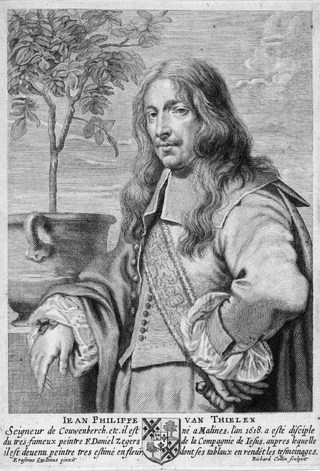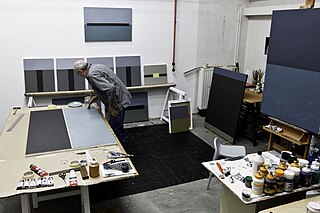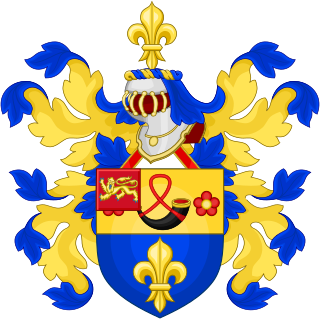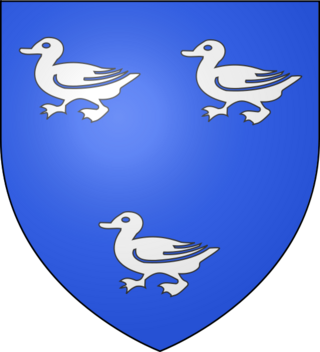

Alexander Joseph Rubens, Lord of Vremdyck, Willenskerk, Ter Schriek, Liesele, Malderen and steenhuffel [1] (died 17 February 1752, in Mechelen) was a Flemish noble man. He was the last male heir of his grandfather.


Alexander Joseph Rubens, Lord of Vremdyck, Willenskerk, Ter Schriek, Liesele, Malderen and steenhuffel [1] (died 17 February 1752, in Mechelen) was a Flemish noble man. He was the last male heir of his grandfather.
He was one of the grandchildren of Peter Paul Rubens and Helena Fourment. His father Frans was married to Suzanne Charles, of noble birth. Her uncle Philippe was Knight of Jerusalem. [2] He was widower of Catharyne Philippine van Parys, who died in 1741. He was responsible for Joannes Alexander and Fredericus Ignatius Rubens, orphans of François II Rubens, and Barbe Francisca de Claer, after his death. [3] Alexander did not have any children. He was buried with his wife in the Saint James' church, Antwerp.
Alexander Rubens was named in 1694 by Royal command Rentmeester-generaal [4] of the King, for Mechelen. [5] He donated from his private fortune for the completion of the Basilica of Our Lady of Hanswijk, he donated the pulpit by private gift of 2.994 gulden. [6] He resided in Liezele castle, bought in 1716.
| 16. Bartholomaeus I Rubens | |||||||||||||||||||
| 8. Jan Rubens | |||||||||||||||||||
| 17. Barbara Arents | |||||||||||||||||||
| 4. Peter Paul Rubens | |||||||||||||||||||
| 18. Henry Pypelinckx | |||||||||||||||||||
| 9. Maria Pypelinckx | |||||||||||||||||||
| 19. Claire of Touion, dite Colyns. [7] | |||||||||||||||||||
| 2. François I Rubens | |||||||||||||||||||
| 20. Joannes Fourment | |||||||||||||||||||
| 10. Daniël Fourment | |||||||||||||||||||
| 21. Joanna Bulteau | |||||||||||||||||||
| 5. Helena Fourment | |||||||||||||||||||
| 22. Peter Stappaert | |||||||||||||||||||
| 11. Clara Stappaert | |||||||||||||||||||
| 23. Catharine le Moisne | |||||||||||||||||||
| 1. Alexander Rubens, Lord of Vremdyck | |||||||||||||||||||
| 24. Balthasar Charles | |||||||||||||||||||
| 12. Gaspar Charles | |||||||||||||||||||
| 25. Catherine de Solbreucq | |||||||||||||||||||
| 6. John Maria Charles | |||||||||||||||||||
| 26. Roland de Tournon Lord of Walbourg | |||||||||||||||||||
| 13. Marie de Tournon | |||||||||||||||||||
| 27. Mary Hallut | |||||||||||||||||||
| 3. Susanne Gratienne Charles | |||||||||||||||||||
| 28. Jacques Roelants | |||||||||||||||||||
| 14. Jacques Roelants, esq. | |||||||||||||||||||
| 29. Elisabeth van der Muyden | |||||||||||||||||||
| 7. Isabella Clara Roelants | |||||||||||||||||||
| 30. Pierre de Schott | |||||||||||||||||||
| 15. Mary de Schotte, dite Douglas [8] | |||||||||||||||||||
| 31. Magdalena Ruts | |||||||||||||||||||
{{cite web}}: CS1 maint: unfit URL (link)
Jan Frans Willems was a Flemish writer, and the father of the Flemish movement.

Jan Lievens was a Dutch Golden Age painter who was associated with his close contemporary Rembrandt, a year older, in the early parts of their careers. They shared a birthplace in Leiden, training with Pieter Lastman in Amsterdam, where they shared a studio for about five years until 1631. Like Rembrandt he painted both portraits and history paintings, but unlike him Lievens' career took him away from Amsterdam to London, Antwerp, The Hague and Berlin.

St. James' Church is a former collegiate church in Antwerp, Belgium. The church is built on the site of a hostel for pilgrims to Santiago de Compostela. The present building is the work of the Waghemakere family and Rombout Keldermans, in Brabantine Gothic style. The church contains the grave of Peter Paul Rubens in the eastern chapel.

Herman de Coninck was a Belgian poet, essayist, journalist and publisher.

Jan Philip van Thielen or Jan Philips van Thielen was a Flemish painter who specialized in flower pieces and garland paintings. He was a regular collaborator with leading Flemish and Dutch figure painters of his time. Van Thielen was the most popular flower painter in Flanders and his patrons included Diego Felipez de Guzmán, 1st Marquis of Leganés and Leopold Wilhelm of Austria, the art-loving governor of the Spanish Netherlands.

Lucas Faydherbe was a Flemish sculptor and architect who played a major role in the development of the High Baroque in the Southern Netherlands.

Charles Emmanuel Biset or Karel Emmanuel Biset was a Flemish painter who had a peripatetic career working in various cities and countries including his hometown Mechelen, Paris, Annonay, Brussels, Antwerp and Breda. He worked in many genres including genre scenes of interiors with merry companies and gallery paintings, history painting, still life and portraiture.

The Mechelen-Zuid water tower is a 143-metre-high (469 ft), combined water and telecommunications tower constructed in 1978. Since 1979, it has supplied the water to the city of Mechelen, Belgium, while also hosting television and telecommunications aerials. The concrete spire passes through a wide disc holding water fifty metres above the ground. Higher up, a smaller disc supports telecommunications equipment. Topped by a decorative stainless steel tube, it is claimed to be the highest water tower in the world.

Dirk van Bleiswijk, or Dirck van Bleyswijck, was a Delft politician and writer.

HelenaFourment was the second wife of Baroque painter Peter Paul Rubens. She sat for a few portraits by Rubens, and also modeled for figures in Rubens' religious and mythological paintings.
Henry Jaye was an English Catholic exile in the Southern Netherlands. He became printer to the city of Mechelen.

Rutger Velpius was a 16th- and 17th-century printer and bookseller. He was the first printer in the city of Mons, and later became printer to the court in Brussels. His career coincided closely with the first decades of the Dutch Revolt

Luc Piron is a Belgian artist. He is a painter and printmaker. He is also a photographer and experiments with the possibilities of computer art.

Tom Van Landuyt is a Belgian actor and singer probably best known for his role as Tom Smits in the Belgian drama film Ad Fundum. He has also starred in numerous Flemish movies, Television series and on stage. In 2002, he married the Dutch actress Angela Schijf.

The Rubens family is a Flemish noble family that lived in Antwerp.

Maria Petyt, also Petijt or Petiyt (1623–1677), was known as a "great mystic". Her writings have been cited as "unequaled in volume and mystical content within the historical context of the Flemish-speaking 17th century."
Jean de Glymes de Berghes or Jan van Bergen, Lord of Waterdijk, was an officeholder in the Habsburg Netherlands.

Constant-Philippe Serrure (1805–1872) was a prolific Belgian historian and collector who taught at Ghent University. He was a founding member and active contributor of the Maetschappy der Vlaemsche Bibliophilen, which published editions of medieval Flemish texts.
The Maetschappy der Vlaemsche Bibliophilen, in its later years Maatschappij der Vlaamsche Bibliophilen was a text publication society based in Ghent, Belgium. The society was founded by Philip Blommaert and Constant-Philippe Serrure in 1839 to produce editions of medieval Flemish literature. It was active until 1909. By current scholarly standards, the quality of the editions shows little palaeographical and codicological expertise.

Van den Eynde is the name of an old Netherlandish noble family. One of the earliest recorded Van den Eynde to use the three-duck canting arms was Jacob van den Eynde, first Councilor and pensionary of Delft, and the highest official in the county of Holland. The Van den Eynde became especially prominent in 16th-century Delft, 17th-century Antwerp and Naples.